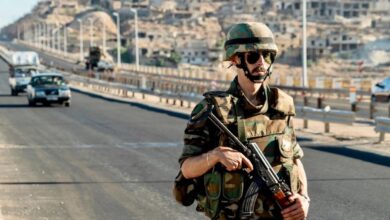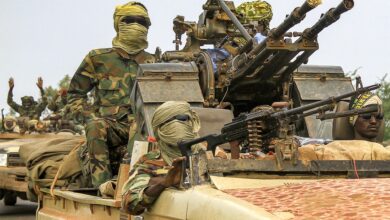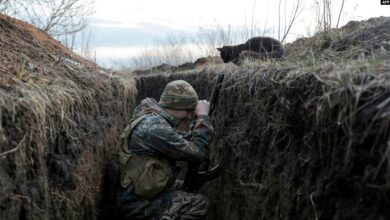The greatest threat to people returning to war-ravaged Raqqa: ISIS mines
RAQQA, SYRIA – Walking through the streets of Raqqa it’s difficult not to spot them: wires of improvised explosive devices. A few minutes before, I was standing in the same place doing an on-camera interview.
“Don’t walk next to the road, it could kill you,” said one of the fighters of the Syrian Democratic Forces who escorted me in the city.
An hour later, one fighter injured by a mine was carried by his fellow fighters in a blanket, transported to the nearest vehicle. “Don’t make pictures!” they shouted once they realized reporters were near.
A senior SDF commander, Haqi Kobani, told The Defense Post that the will of Islamic State was broken in Raqqa. But before their defeat, “Daesh planted mines and carried out suicide operations, because this was their main stronghold,” Kobani said.

Now fighters say that Raqqa is liberated, although SDF fighters and civilians alike will have to deal with the mines ISIS left behind.
“We must clear the remnants of all the explosives that have been left in Raqqa throughout this battle. One of the SDF commanders earlier in the campaign, maybe a month ago, said that the fight in Raqqa is more about a fight against IEDs and explosives than it is against ISIS, because that’s what the nature of the fight normally was,” Coalition spokesperson Colonel Ryan Dillon told reporters on Tuesday.
A day earlier, Idris Mohammed, brave leader of the Raqqa Internal Security forces, was killed when he tried to visit his home in Raqqa. Dillon said Mohammed had triggered an IED while walking through the city.
“Comrade Idris came to the point where we were [in Raqqa] and he wanted to go to his house,” Ehmed Dadeli, a YPG official and good friend, told The Defense Post. “The SDF warned him that the neighborhood he lives in is mined, and put checkpoints there so no one could enter, but he insisted on going, and he was with a leader of the SDF, and after he went, a mine exploded, and he died.”
Two SDF fighters were also killed in the incident.
A U.S. official told The Defense Post: “We mourn the death of Commander Idris Mohammed. As leader of the RISF, he led a force committed to bringing back justice to lands ruled so brutally by Daesh. His death sadly underlines the ongoing struggle against the threat of ERW (explosive remnants of war) and IEDs left behind by this most evil enemy which has planted these explosive hazards in schools, hospitals, and even in thousands of private homes in Raqqa, leading to such needless deaths.”

Jihan Sheikh Ahmed, the spokesperson for the Raqqa campaign, also wanted to visit her house, she told The Defense Post on Thursday. “I want to go, but the area of my house is completely mined, so I cannot go there,” she said.
Even the countryside of Raqqa is not completely safe. Ammar al-Hassan, from the village of Kibash Gharbi, and former head of the Education Committee of the Raqqa Civil Council, was killed on September 8 when he visited a school in his village to assess the damage to the building.
Nazmi Mohammed, head of the Raqqa Civil Council’s reconstruction committee in the town of Ain al Issa, told The Defense Post they cannot reconstruct anything before clearing out the mines.
“The mines are still around the houses. For instance, one of my English translators, his family tried to escape, but five of them were killed because of mines,” he said. “We cannot do anything yet inside of the city of Raqqa until they clear the mines,” he said, complaining about a lack of support.
Save the Children, one of the non-governmental organizations working in northern Syria, said in a recent press release that substantial investment will be required to reconstruct Raqqa’s destroyed homes, health facilities and schools, and to remove unexploded ordnance before people can safely go home. The charity added that some 270,000 people who fled the city are in need of urgent aid.
Other NGOs, such as the Mines Advisory group, are helping with the demining effort, but support is still limited.
“The problem is that they [ISIS] sometimes use better technology then we, we have seen that. They have real clever people that came from Europe, Russia, and Uzbekistan, and Turkey … and they are very good with mines,” Heval Ari, a Danish SDF fighter, told The Defense Post.
“Sometimes the bomb squads defuse mines, and a mine under it explodes. It was used in Iraq and Afghanistan too,” he said.
Ari said the SDF needs support from international organizations to help with reconstruction. “If the people of Raqqa don’t get help from outside, it could take 10 years time to rebuild it.”

The State Department’s Bureau of Political-Military Affairs’ Office of Weapons Removal and Abatement is leading the U.S. effort to clear mines and other explosives from areas recaptured from ISIS. A U.S. official acknowledged that clearing mines “will take years if not decades to complete.”
“The aim is to clear as many critical infrastructure sites as possible that would allow for broader stabilization efforts to take place, while simultaneously training a local capacity that could take lead of this effort into the future,” the official said.
The State Department’s partners on the ground hope to move into Raqqa city “in the very near future,” and are currently marking and clearing contaminated sites, according to the official.
There are still signs warning of landmines in many of the towns and villages around Raqqa city that were retaken from ISIS months ago. However, the U.S.-led Coalition has promised to speed up demining in the city.
“Once Raqqa is liberated and we, the United States along with its coalition partners – the 73 coalition partners have been working very hard on this for months and months now – what we would then next do is work on some of the demining,” State Department spokesperson Heather Nauert, said on Tuesday.
“Eventually, we would get to the point where we would start to remove some of the rubble, get to the point where we would get the electricity going once again, providing clean water.”
Fergus Kelly contributed reporting to this story















